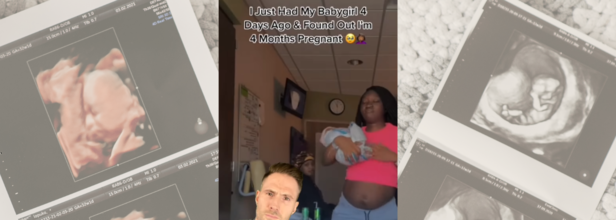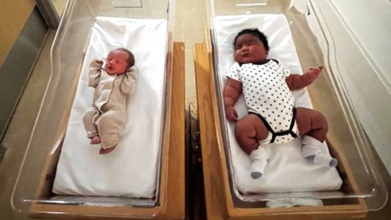- Health Conditions A-Z
- Health & Wellness
- Nutrition
- Fitness
- Health News
- Ayurveda
- Videos
- Medicine A-Z
- Parenting
Woman Discovers She Was 4 Months Pregnant Days After Giving Birth—Doctor Explains How

Credits: Instagram & Canva
Dr Joe Whittington, who goes by Dr Joe on his social media platforms is a certified MD in Emergency Medicine based in Apple Valley, California is a social media medical educator. He uploads many real-life health-related stories and cases to educate general public about it. In one such videos, he featured a woman who just had her baby four days ago and found out that she was four months pregnant.
Is This Possible?
Dr Joe says, "technically, yes". This phenomenon is known as superfetation that occurs when a woman releases an egg and it gets fertilized and implanted after she is already pregnant.
He says, "Usually pregnancy changes such as hormonal changes, changes in the uterus, and the cervical mucous plug all work to prevent this. So superfetation is extremely rare with only about 10 documented cases. But, it is possible."
What Is Superfetation?
It is a rare phenomenon where a second pregnancy occurs alongside an existing one. This happens when another ovum or the egg is fertilized by sperm and implanted in the womb days or weeks later than the first one. Babies born from superfetation are often considered twins as they may be born on the same birth on the same day. However, not always does it happen. In the case that Dr Joe picked up, the baby had a difference of four months.
ALSO READ: Pregnancy Trimesters, Everything You Need To Know About It
So, How Does It Happen?
In humans, pregnancy occurs when an egg is fertilized by sperm and implants in the uterus. For superfetation to happen, a second egg must be fertilized and implanted separately while a pregnancy is already underway.
For this to occur, three highly unlikely events must take place:
Ovulation during an ongoing pregnancy – This is rare because pregnancy hormones typically prevent further ovulation.
Fertilization of the second egg – Once pregnant, a woman’s cervix forms a mucus plug that blocks sperm from entering, making fertilization extremely unlikely.
Implantation in an already pregnant uterus – Implantation requires specific hormonal changes that usually don’t occur once pregnancy has begun.
Additionally, a growing fetus takes up space, making it harder for another embryo to implant.
Because these conditions are so improbable, superfetation is considered nearly impossible in natural pregnancies. However, a few reported cases exist, primarily in women undergoing fertility treatments like in vitro fertilization (IVF). In such cases, an embryo is transferred into the uterus, but if ovulation unexpectedly occurs and the egg is fertilized, superfetation might happen a few weeks later.
Could There Be Any Complications?
The biggest complication with superfetation is premature birth. The baby maybe born before time and could have the following medical conditions:
- trouble breathing
- low birth weight
- movement and coordination problems
- difficulties with feeding
- brain hemorrhage or bleeding in the brain
- neonatal respiratory distress syndrome, which is a breathing disorder caused by underdeveloped lungs
Women too could have complication, which includes high blood pressure and protein in the urine, a condition called preeclampsia, and gestational diabetes.
Giant 99th Percentile Baby Of 5.9Kg Born In New York Has Taken The Internet By Storm

Credits: Canva
A giant baby weighing 5.9 kg was born to a mother in New York. She was left in shock and amaze when she saw that she had delivered a boy much bigger than she expected. The newborn baby weighed almost twice as much as an average baby. The baby is born to Terrica and Shawn on January 31 in Cayuga Medical Center. His weigh has made him the heaviest baby ever born at the Ithaca-based hospital, reported the NY Post.
The mother of four said she knew her son would be a little heavy, however did not know he would be this big. She said he is already wearing three-to-six month old baby clothes and diaper. She feels like she has given birth to a three-month-old.
The hospital also posted a photo of the baby on Facebook, comparing him with another newborn baby alongside. The other baby too was born on the same day, whose name is Margot and weighs only 1.8 kg.
Robyn Torgalski, System Director of Maternal and Child Health at Centralus Health, described the two births as a powerful reminder that every newborn and every birth story is unique. She noted that whether a baby weighs four pounds or thirteen, the medical team is fully equipped to deliver the highest level of care to both mother and child. Torgalski added that she is proud of the maternity services at Cayuga Health and feels privileged to support families during such an important life event.
Read: 99th Percentile Baby: What It Means, Risks, And What Parents Should Know
Giant Babies: All About Them
As per the Guinness World Records, the heaviest recorded baby ever was 9.97 kg born in Italy in 1955.
Dr Sermed Mezher, a digital health content creator, and a London based GP, shared: "Babies in the womb who measure in the 99th percentile for weight are referred to as macrosomic baby, meaning they are significantly larger than average for their gestational age. While most macrosomic babies are healthy, their larger size can increase the risk of certain complications during pregnancy and delivery."
What Does It Mean To Be A 99th Percentile Baby?
Babies in the 99th percentile for weight are larger than 99% of babies at the same gestational age. This may lead to birth complications such as shoulder dystocia—when the baby’s shoulders become stuck during delivery—or increase the likelihood of cesarean section. Mothers may also experience a higher risk of perineal tearing, postpartum hemorrhage, and greater pregnancy weight gain. Contributing factors include maternal diabetes, genetics, or excess weight gain during pregnancy.
This larger birth size is medically categorized under fetal macrosomia, which refers to babies in the top 10% of weight for gestational age—with the 99th percentile representing the most extreme cases.
What Causes A Baby To Be a 99th Percentile Baby?
While we do not know the cause in this case, there are certain reason a baby may fall into the category, which includes:
- You have a large fundal height (a measurement of fetal growth)
- Significant weight gain during pregnancy
- Gestational diabetes or pre-existing diabetes
- History of delivering large babies
- Prolonged pregnancy past due date
- Parental genetics (you were a large baby yourself)
Rare Brain Surgery In 2.5-Year-Old Helps Reverse Devastating Stroke Effects

Credit: Canva
A team of doctors in Uttar Pradesh successfully performed a rare and highly complex neuro-interventional procedure on a two-and-a-half-year-old girl that enabled significant neurological recovery.
The child initially had severe indigestion and mild fever. However, it quickly escalated into repeated seizures, altered sensorium, and sudden loss of movement.
At ApolloMedics Super Speciality Hospital, Lucknow, the child was diagnosed with deep Cerebral Venous Sinus Thrombosis (CVST) with multiple brain infarcts -- a condition associated with high mortality risk and potentially devastating long-term neurological disability.
“Deep cerebral venous thrombosis in toddlers is exceptionally rare, and neuro-intervention in pediatric stroke is particularly challenging because of the small size of vessels and increased risk of bleeding,” said Dr. Dewansh Mishra, Interventional Neuro-Radiologist, at ApolloMedics.
“Literature on catheter-directed thrombolysis in such young patients is limited. In this case, the child was deteriorating quickly, and timely escalation to precision neuro-intervention was crucial to prevent irreversible brain injury and give her the best possible chance of recovery,” he added.
The Rare Brain Surgery
Dr. Mishra said that the child was also diagnosed with Antiphospholipid Antibody (APLA) syndrome, a clotting disorder that increases the tendency of blood to clot excessively.
Infection and dehydration further worsened the condition and accelerated stroke progression.
Recognizing the urgency, a multidisciplinary team of doctors took a critical, high-risk decision to escalate treatment without delay. They performed intracranial catheter-directed thrombolysis, under general anesthesia, preventing irreversible brain injury in the toddler.
Through the femoral vein in the thigh, a microcatheter was carefully navigated into the intracranial venous system, and clot-dissolving medication was delivered directly at the site of thrombosis to restore venous drainage. This was successful in limiting further neurological damage.
"After nearly three weeks of intensive care and rehabilitation, the child was discharged with significant neurological recovery. She is now able to walk, speak, and perform activities that children of her age do," the hospital said in a statement.
The case, marked by rapid deterioration and a narrow window for intervention, will be presented at the Indian National Stroke Conference 2026 in Kochi, underlining both its clinical significance and the growing capabilities of advanced stroke care in India.
Can Stroke Occur In Very Young Children?
While stroke is more common in adults than in children, the condition can occur in children and debilitate their lives.
Pediatric stroke is a rare condition affecting one in every 4,000 newborns and an additional 2,000 older children each year.
Stroke in young children is similar to that of adults and is caused by a brain injury due to the interruption of blood flow to part of the brain.
In young children, the diagnosis is often delayed. A stroke typically begins suddenly in children and infants, with Seizures the most common symptom.
Extreme sleepiness or altered mental status and a tendency to use only one side of the body are other major symptoms.
Priyanka Chopra, Nick Jonas Open Up About Malti’s Premature Birth And NICU Battle

Credits: Canva
Priyanka Chopra and Nick Jonas, we all know them as a power couple. However, there are moments that have broken them and they both have talked about it. This was the moment of their daughter Malti Marie Chopra Jonas' birth.
On February 4 episode of the Jay Shetty Podcast, Jonas, 33, opened up about his daughter's birth. "She came to the world under sort of very intense circumstances, which I have not really talked about ever. She came out, she was one pound and 11 ounces, and purple basically. These angels at the NICU kind of resuscitated her in that moment, got her taken care of really quickly, and intubated and everything else."
Also Read: Shingles Can Strike More Than Once, Vaccination Offers Protection, say experts
In fact, recently a video has been circulating of Priyanka Chopra Jonas talking about the premature birth of her daughter too. She described this period as "tough" and said that it was extremely hard on her. She also called Malti a "miracle baby".
On the Jay Shetty podcast, she revealed that the couple were forced to announce her birth, whereas they wanted to wait till her health gets better. They had put everything on halt and visited the NICU every single day. "We received a text saying that her (Malti) birth would be out in the newspapers, if we don't, they are going to put it in within three hours. So we were kind of forced into announcing her birth because we wanted to control our own narrative. We weren't ready. We didn't know what would happen with her or how she would be."
Malti's Premature Birth
Priyanka shared that she was informed about her premature delivery in the 27th week. This is what made her completely "shut down". She also recalled sitting in front of the fireplace for nine hours and was not able to process the situation.
Like Jonas, Priyanka too noted that Malti was purple at birth and required immediate NICU attention. She also said that the nurses' fingers were too big for her small mouth. She recalled feeling "numb" at that time.
However, Jonas shared that Priyanka and him "had a lot of tough conversations day in, day out about caring" for Malti. He also appreciated his wife's strength on handling the situation. "The way in which she handled it was so inspiring to me, and you know, allowing for those days to be tough, but to be tougher for our little girl was the focus."
Malti received six blood transfusions and gained weight in the hospital. After nearly three and half months, she was able to go home.
Priyanka reveals that in her house there is a "big mandir" with "a large Shiv Ji murti". This is where everyone sat as a family and she cried not out of fear, but out of gratitude. "Gratitude that she survived, that she was home, that she chose us, and that we were able to make it happen. IVF is tough."
Read: What Parents of Premature Babies Must Know About the NICU, According to a Neonatologist
What Parents Of Prematurely Born Babies Must Keep In Mind?
Health and Me had earlier spoken to Dr Sanjay Wazir, Medical Director, Neonatology and Pediatrics at Motherhood Hospitals, Gurugram who pointed out that Neonatal Intensive Care Unit or the NICU may seem overwhelming, however, it must be seen as a sanctuary of healing.
"In the NICU, premature or unwell newborns receive specialized medical attention, constant monitoring, and compassionate care from expert hands. Here, the mother and the baby are well taken care of. This will help the baby lead a healthy life. Hence, NICU care is important for all the premature or unwell babies," he says.
What Happens Inside The NICU?
The doctor explains that the NICU provides a controlled and nurturing environment where babies can grow stronger outside the womb. "It helps maintain their body temperature, supports breathing, and ensures proper nutrition through feeding tubes if necessary," he says.
Every machine in the NICU is for a specific purpose, right from oxygen support to heart rate monitoring, ensuring that each baby receives precisely what they need. Parents often find comfort knowing that the experts in the NICU are constantly watching over their child’s progress, explains the doctor.
The doctor points out that parents are essential part of the NICU journey. "Your touch, your voice, and your calm presence can help your baby feel safe and comforted," he tells to all the parents. However, what is extremely important is to maintain hygiene guidelines, staying involved in daily care, and communicating regularly with the doctors and nurses to "strengthen your bond and confidence as caregivers." The doctor says that during this time, the mother will also be taught about Kangaroo care, which is skin-to-skin contact that helps the mother bond with her baby.
© 2024 Bennett, Coleman & Company Limited

